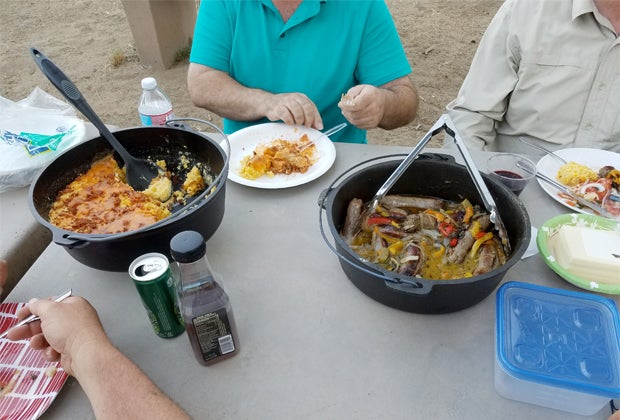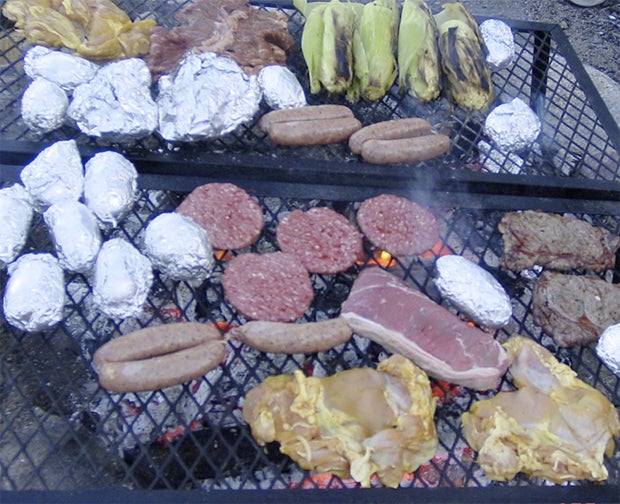
We were in a real jam. Two days into a 10-day trip in Monument Valley, mechanical problems forced two vehicles to head home. We hated to lose our the four-wheeling friends, but more importantly, we ran into a minor food crisis: How do we account for the meals those individuals were scheduled to prepare?
Each of us brought food for our designated meals, but we were counting on those individuals to contribute on their assigned days. Suddenly we were scrambling to account for their departure.
This incident, while not typical of a 4WD experience, does happen. A good Trail Master understands and accepts this, and factors it into trip planning. Of all the myriad decisions you make, one is how to handle meals.
There are three possibilities, although only two are practical for the average 4WD trip.
- Everyone cooks their own meals
- Cooking duties are rotated among the participants
- All or most of the meals are catered.
At the end of a long day, I am not interested in cooking for a large crowd, so I won’t deal with the catered meal option. It can and does work if you have a club (with lots of volunteers) putting on an event.
Make this decision early on so you can move forward with your planning. Generally this is a fairly easy decision when traveling with friends or family members. Even better, you might have a cook in the group. That’s a huge plus. It gets a bit more complicated when you travel with those you don’t know as well.
Want to make it easy on yourself? Ask everybody to be responsible for their own meals.
Let’s study your options for meal preparation.
Participants Cook Their Own
We talk a lot about self-sufficiency in four wheeling. It’s important for participants to have the right gear and supplies with them. Responsible four wheelers never go off-road hoping they can lean on others. Food is no different. At a minimum, all four wheelers need to prepare for emergencies, which can include being stranded alone. A big advantage here is that everyone enjoys their favorite meals. (Remember that we’re talking about breakfast, lunch and dinner.) The entire party doesn’t encounter issues related to personal preferences, allergies or other matters. In theory, everyone is a happy camper, at least as far as meals go.
As Trail Master, your trip plan should include enough information so that participants can plan their meals accordingly. Even so, be prepared to help a guest who forgot a key item or utensil.
And, you may have a cook in your group—that’s a big plus. On my last trip, I heard “cook you breakfast if you have the bacon and eggs”. I did and enjoyed it.
There are a couple drawbacks to this model
If one group forgot to pack a particular food item or utensil, those folks may have to go without. Just depends on whether anyone else has what they need.
The larger issue I’ve seen is more of a social one. Everyone tends to gravitate toward and hang around their own campsites. We don’t get as much interaction and bonding. I prefer that in my outings.

Family Style
There is a hybrid model that works pretty well for dinners. With this, we set up a big grill over the campfire. Everyone cooks their own food on the grill. Participants still congregate, and there is no squabbling over preferences. (Those who don’t like grilled food, of course, are encouraged to bring something else.)
Rotate cooking duties
With this arrangement, each vehicle/group cooks at least one day’s worth of meals (breakfast, lunch and dinner). That can entail a significant amount of food for larger parties and longer excursions. (Each vehicle/group would be responsible for more than one day of cooking.)
This arrangement promotes family-style dining. Everyone gathers around a campfire at day’s end, then enjoys what the “cooks of the day” have prepared. It’s a great way to spend an early evening.
It is nice to have several days off cooking detail. The diversity of meals is generally enhanced. But ask everyone for their menu to avoid chicken every night. The next outing might promote some competition among the chefs to the benefit of the “eaters”.
It takes significantly more planning and coordination. You need to know all the participants can cook a reasonable meal for everyone’s enjoyment - beyond hot dogs and bean.
One risk with shared meals is that you’ll get shorted if a vehicle backs out. That was the case in Monument Valley. The remaining meals were now spread among fewer participants.
Those leaving offered us the food planned for their meals. Problem was, we were really tight for space, especially for perishables. One guy lent us an ice chest, but the on-board refrigerators left with their owners. (The remaining vehicles didn’t have the room for those anyway.) There were some tense moments for a while. Had those vehicles departed later in the trip, everyone’s supplies would’ve been down and storing the extra food would not have been a problem.
If this happens during your trip, make sure you grab any utensils, spices or other ingredients necessary for those other meals. They are easy to forget in the chaos of the moment.
We managed to pack in the extra food and finish our trip through Monument Valley.
Dinners can also go potluck style. Make sure everyone is clear on what they’re expected to bring. Otherwise you could end up with nothing but chips and salsa.
As Trail Master you have many responsibilities. One of these is coordinating the meals. What are some issues you’ll face, and how will you address them? Based upon the make-up of your party, try to determine what offers the most enjoyment for your participants.
Lots of other things can go wrong on a trip. That just adds to the adventure. But great meals and plenty of food make the trip!
MORE TRAIL TIPS STORIES
5 Tips for Concluding a Successful Off-Road Trail Ride
How to Replace U-Joints on Your 4x4
Trail Tips: What Causes Washboard Roads?
Badlands Off-Road Adventure
Off-road trainer Tom Severin shares insight and tips on a variety of topics related to preparing you for that next off-road adventure. With over 40 years of off-road experience, Severin operates under his business Badlands Off-Road Adventures. He is a certified professional 4WD Trainer by the International 4-Wheel Drive Trainers Association and a Wilderness First Responder (WFR). He is a member of the California Association of Four Wheel Drive Clubs (CA4WDC), United Four Wheel Drive Associations and the BlueRibbon Coalition. He also is a certified UFWDA and a CA4WDC 4WD instructor.
For more information about Badlands Off-Road Adventures, visit 4x4training.com.


 Your Privacy Choices
Your Privacy Choices